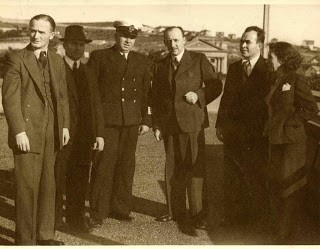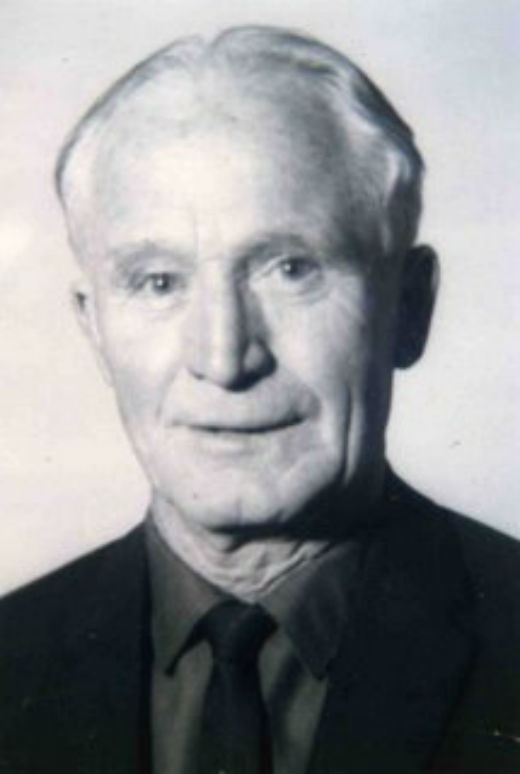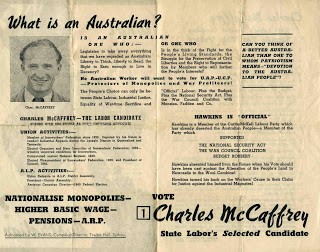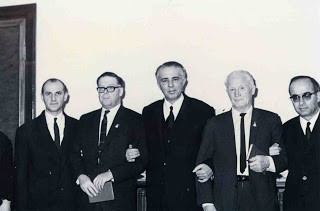Comrade Charlie McCaffrey
Written by: on
(from Vanguard February 1987)
Comrade Charlie McCaffrey has passed away.
His death came quietly in the early hours of the morning on Wednesday February 11 after a brief illness.
He would have been the last to have wanted any sort of recognition or eulogy, yet his position as a leading comrade of our Party demands it.
Comrade McCaffrey was born in 1904 in Glasgow, Scotland. As a young man he travelled to Australia. He was a member for a short time of the Australian Workers Union in Mildura before joining the Newcastle branch of the Federated Ironworkers Association in 1926.
Possessed of a fiery temperament, Charlie burned with the indignities and injustices suffered by working people under capitalism. A brilliant organiser and leader of his peers, he worked tirelessly within the labour movement, and recognised in the Communist Party and in Communism the only answer to the social contradictions of class society.
In 1938 he was deputed by the FIA to conduct industrial appeals during the Lysaght dispute in Queensland and Tasmania. He was elected and organiser and State Councillor of the FIA in 1939.
The out break of the war saw an attempt to introduce the so-called National Register, a forerunner of today’s semi-fascist ID card. Comrade McCaffrey campaigned strenuously against the National Register, a fact noted in his favour when he stood as a candidate for State Labor in the 1941 NSW elections. (State Labor was an attempt by left Labor and Communist activists to oust the right-wing Curtin-McKell Labour Party.)
As Vice-President of the Newcastle Trades and Labour Council during the Second World War, Charlie successfully integrated the defence of workers’ living standards and working conditions with all-out support for the allied war effort against fascism. He negotiated skilfully for the resolution of disputes involving Greek crews on ships calling at Newcastle. The conditions of work for Greek seamen were atrocious and they were involved in frequent stoppages of work when they reached the Australian coast. Upholding principle and dealing with the various ships’ officers, Charlie was able to secure returns to work, earning him the praise in February 1943 of Rear Admiral J Muirhead Gould and in January 1944 of the Department of Supply.
 (Charlie, left, with Soviet navy personnel and Newcastle officials)
(Charlie, left, with Soviet navy personnel and Newcastle officials)
A matter of great satisfaction to Charlie at this time was the visit to Newcastle of ships of the Soviet Navy. He personally hosted the Soviet naval officers during their stay in Newcastle, and organised a massive public meeting and Mayoral reception for the Soviet sailors in the Newcastle Town Hall.
At the end of the war, Comrade McCaffrey was called on by his union to transfer to Adelaide where he took up the State Secretaryship of the FIA. The Ironworkers had been eclipsed by the right wing Australasian Society of Engineers under Alby Thompson. One of Charlie’s first duties was to organise a visit to the Pope factory where he was shown the plant under the watchful eye of owner Mr Barton Pope. After conducting his union work, Charlie was approached by Pope and told that anything that he had seen in the factory (mainly whitegoods products) that he wanted for his own use could easily be delivered to his home. Charlie’s reply was short and contemptuous. A shocked Barton Pope responded: “Hell, you’re not like Alby at all - his place is full of our stuff!”
Charlie’s outstanding communist qualities quickly earned him a place on the SA State Committee of the Communist Party of Australia. For many years he was widely acknowledged as the “No. 1 Communist” in South Australia, a description he himself would have disliked, but one which was earnt through a fearless devotion to the Party during difficult times, and an unwavering commitment to furthering the interests of his class.
In 1959 Comrade McCaffrey took part in a visit by an Australian Communist delegation to the People’s Republic of China. Also on that delegation was the late Ernie O’Sullivan with whom Charlie was to form a lasting friendship. Inspired by the efforts of the Chinese people to build socialism, Charlie returned to South Australia determined to establish a local branch of the Australia-China Society.
His efforts bore fruit in the early sixties when an SA Branch was established. Its first office-bearers were Joe Drummond (President.), David Caust (Secretary), Lil McCaffrey (Treasurer) with a Committee comprising Roy Baynes, Bill Warton, Marj Johnston and Alice Thornton. Later made a Life Member of the Society, Charlie always maintained a close and supportive interest in its activities.
The early Sixties were also, however, a period of division and fragmentation in the Communist movement. Although the 1963 State Conference of the CPA had resolved to “express to Comrade McCaffrey its sincere appreciation for his work on the State Committee of the Party over a period of many years”, he grew increasingly dissatisfied with the path taken by the CPA national leadership. With David Caust, Roy Baynes and others, he analysed the contradictions that led to the formation of the CPA (M-L), under the leadership of Comrade Hill in Victoria. His decision to join the new party considerably strengthened the CPA (M-L) outside of its home base in Victoria.
Following the defeat of the Communist leadership of the Ironworkers in 1951, Comrade McCaffrey had returned to the factory floor - to the SA Rubber Mills plant at Edwardstown. He resisted numerous offers of “advancement” including from within the Labor Party. It was suggested that he should withdraw from the CPA, that a position in Parliament was only a matter of time. For 17 years Charlie worked at the Rubber Mills both as a Communist and as a union delegate for the workers in the factory. He left only in 1969 to undertake the responsibility with his wife Lil of opening and running the East Bookshop.
As a leading member of the Communist Party of Australia (Marxist-Leninist), Comrade McCaffrey became a focal point for the revolutionary young people during the late Sixties and early Seventies. The rapid expansion of the Party in South Australia at that time was in large part due to Charlie’s faith in newer and younger comrades, and to the care he took in guiding and encouraging their ideological development. He travelled to both Albania and China with Comrade E. F. Hill and encouraged our study of Hill’s writings. He made extensive contributions to the national leadership of the Party and was one of a select group of “elder statesmen and -women” whose views were solicited by a newer and younger leadership. In the early Eighties he joined Comrade Hill in representing the Party in discussions with the CPA, contributing to a better atmosphere within the Australian Communist movement.
(Ted Hill, 2nd left, and Charlie, 2nd right, with Enver Hoxha and Albanian comrades)
 (Charlie, 3rd left and Ted Hill, 3rd right with Kang Sheng, centre, and Mme Deng Yingchao, 2nd left)
(Charlie, 3rd left and Ted Hill, 3rd right with Kang Sheng, centre, and Mme Deng Yingchao, 2nd left)
Comrade McCaffrey was a statesman of his class. He was a fierce warrior of, and for, the proletariat. He was fierce in his commitment to Marxism-Leninism and withering in his contempt for those whom he considered had used their working class positions or contacts for personal gain or advancement. He had a depth of analysis that was born of practical experience of class struggle and refined by study of the Marxist classics. He was a man of enormous personal dignity and bearing.
His memory will always be honoured.
Print Version - new window Email article
-----
Go back
Independence from Imperialism
People's Rights & Liberties
Community and Environment
Marxism Today
International
Articles
| Vale Ron Owens |
| VALE Wallace McKitrick: cultural fighter (1950-2025) |
| Farewell Judy Henstock Murupaenga |
| Jack Shapiro: A star shining in our sky |
| Farewell Marie Shapiro, comrade and internationalist |
| Martin O'Malley: Australian Communist Party condolence message |
| Martin O’Malley – Comrade and Friend |
| Vale - Stephen Darley |
| Ernie O’Sullivan |
| Basil Steffanou – A Comrade Who Served the People |
| Harry Danaher – a grand old fighter for socialism |
| Bert Chandler – Lifelong struggle for liberation of the people |
| Kath Williams (1895-1975) |
| More than meets the eye – the CPA(ML) in NSW Part 4 – No surrender |
| More than meets the eye – the CPA(ML) in NSW Part 3 – Whitlam, Uncle Sam and the People |
| More than meets the eye – the CPA(ML) in NSW Part 2: Vietnam, state forces and an east wind |
| More than meets the eye – the CPA(ML) in NSW Part 1 Bert and Syd |
| Betty Little-O’Shea – working class communist |
| Comrade Betty Little/O'Shea: Lifelong Communist |
| Dulcie Steffanou: A communist life devoted to serving working people |
-----




